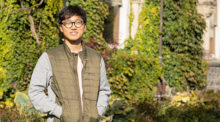Ali Taha
Chan-min Roh is a first-year political science student who wants to make a difference. As a Munk One student and one of the University of Toronto’s three 2019 Loran Scholars, Roh is coming into university with an open mind and an ambitious work ethic. On top of his six-course workload, Roh is a part of the Hart House Debating Club, a member of the HanVoice Support Association, an advocacy group for North Korean human rights; and a member of a taekwondo club. We spoke with Roh about his university experience and future aspirations, which include working in the field of public policy or diplomacy.
Why Munk One?
Munk One was recommended to me by a couple of students who were also Loran Scholars. Each person told me that Munk One is a great program to integrate yourself into U of T. The niche, intimate environment of classes really appealed to me. Munk One has allowed me to explore so many different topics—from poverty in rural Mumbai to the effects and consequences of climate change. And I didn’t just get a glimpse into the issues. We really dove deep into the course material.
I like to speak when I feel like I have a firm understanding of the subject, but Munk One really pushes me to speak about and interact with a wide range of topics, even when I don’t know much about them. It’s been uncomfortable in many cases, but worthwhile. I appreciate that the program has allowed me to be bolder in how I interact with complex subjects.
What is a global issue you are interested in at the moment?
The dynamics of inequality that exist in the world. It’s something that’s clear for us all to see. In many countries, there is a growing gap between the rich and the poor, the marginalized and the elite. I really want to dive into that more and hopefully, in the future, be able to think of mechanisms that can equalize those divisions. Inequality is an issue that can be found in any country and in any region. It’s something that is very pervasive, and I think it’s an issue students should be looking towards solving once they’re out of university.
I’m also really interested in Korea and the geopolitics in that area, which include the dynamics between North and South Korea, as well as the region’s history and its narrative.
What sparked your interest in Korea?
I was born in Korea and my family has its roots in Korea, so I’ve always been drawn to that region. Coming to university, having the academic liberty to read and talk about Korea, has only reinforced my interest. A dream I have—if Korea were to be reunited one day—is to be a part of that process.
Who has influenced you most in life and why?
My parents. I’ve learned a lot from watching them over the years. We immigrated from Korea to Canada when I was four years old and watching them successfully integrate themselves into a foreign land with no support networks and limited resources was very empowering to see as a child. They were determined, and that has kept me grounded coming into university.
What is your personal philosophy?
It’s been really important for me to do good for others. I think the reason I’m working so hard right now and trying to live a disciplined life, and learning as much as I can, is so that I can have an impact on the world, one in which I help raise up other people.
February 18, 2020
